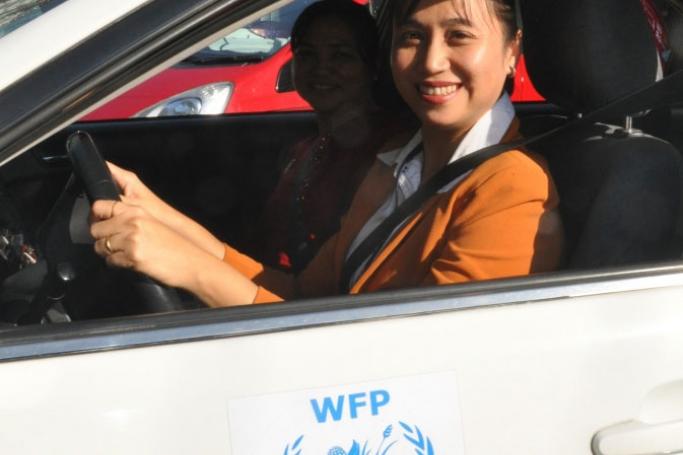When WFP in Myanmar informed Ms Khin La Pyae Won Myint Aung that she was selected for the position of driver in the WFP Country Office in Yangon, it was a dream come true. She has always had a passion for cars so was thrilled to have the opportunity to make a living by driving. The sense of accomplishment of getting a new job was enhanced by the feeling that, in doing a job typically dominated by men in Myanmar, she was also striking a blow for gender equality.
The 38 year-old Khin lives in Yangon, where her father owns a car rental agency. In 2001, she graduated from the Dagon University with an honours degree in chemistry. The study of molecules and compounds may be worlds apart from driving cars professionally, but both show Khin's determination not to let tradition stop her from pursuing her dreams. In following in her father’s footsteps, she chose to pursue her long-held passion for cars.
With encouragement and support from parents and friends, she dared to challenge stereotypes and apply for the position with WFP and got confirmation of her success in January 2017. As the first female driver not only in WFP, but also the entire UN system in Myanmar, the Gender Team was excited to chat with Khin about her first impressions and observations working in a traditionally male-dominated field.
What is it like being a female driver, particularly in a male-dominated environment?
Many people expect to hear that being a female driver is tough and that I face constant harassment. But I have never thought of my profession like that. Being a female professional car driver is all that I know. I expect the slightly surprised looks when passengers first see me opening the back door for their convenience. But other people may automatically consider me as a role model for other women and girls. It is like every other job with its ups and downs.
What has been your experience so far working as a driver?
I have been driving and working in my family’s car rental business for 14 years. Sometimes, I had to go to distant and dangerous destinations such as the mountainous and border areas in Chin and Shan States. In addition, as the eldest daughter in my family, I was the one to manage the family business while my father was on trips.
Why WFP? Did you have any particular reason for your interest in working with WFP?
The reason I wanted to work for WFP is its mandate to fight hunger in my country. I am happy to participate and contribute even as a driver to ensure food security for all the people in need. I also believe that gender equality, which is a challenge in Myanmar, is one of WFP’s main priorities in achieving zero hunger.
Why are there so few female drivers in Myanmar, in your opinion?
The traditional perception prevails that driving a car is a man’s job and dangerous. The majority of people still strongly believe that women are responsible for domestic chores and that driving is risky and not suitable for women. Moreover, we just started driving cars with automatic gear within the last few years, which is one of the main factors of the rise in female drivers in Myanmar.
What needs to change to have more public female drivers in Myanmar?
Create job opportunities and support them if and where required. Especially security for female drivers is important. I encourage all women to look for the work opportunities of their dreams if they possess the required qualifications, even if the positions are unusual.
WFP’s Work on Gender Equality and Women’s Empowerment in Myanmar
WFP in Myanmar has given special attention to gender through its policies and was selected for the Gender Excellence Award 2015-2016. WFP is committed to addressing gender disparities in staffing and to champion gender equality and women’s empowerment in all its operations in Myanmar. Khin’s story is positive but the challenge remains whether or not broader society is willing and able to support women embracing alternative gender roles.
You are viewing the old site.
Please update your bookmark to https://eng.mizzima.com.
Mizzima Weekly Magazine Issue...
14 December 2023
Spring Revolution Daily News f...
13 December 2023
New UK Burma sanctions welcome...
13 December 2023
Spring Revolution Daily News f...
12 December 2023
Spring Revolution Daily News f...
11 December 2023
Spring Revolution Daily News f...
08 December 2023
Spring Revolution Daily News f...
07 December 2023
Diaspora journalists increasin...
07 December 2023
Landslides kill 12 as monsoon batters refugee camps












